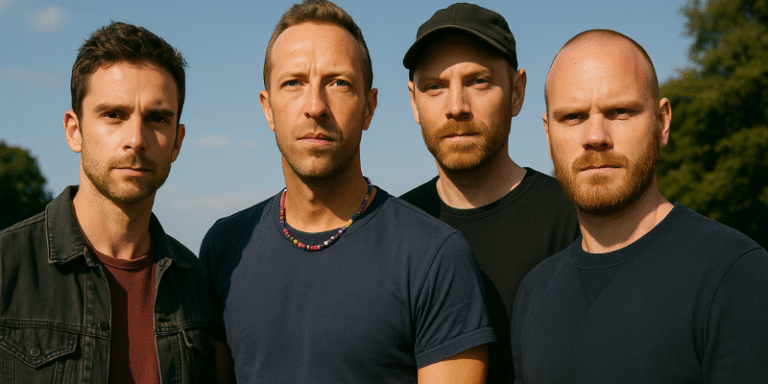Formed in London in 1996, Coldplay—comprising Chris Martin, Jonny Buckland, Guy Berryman, and Will Champion—transformed from a university band into one of the most successful and influential acts in modern music (Wikipedia, 2025a). Their early work, particularly the debut album Parachutes (2000), redefined melodic alternative rock with emotional honesty and understated instrumentation. It sold over 2.7 million units in the UK and is now considered a benchmark for the genre (Wikipedia, 2025b).
1.0 Origin of the Band
Coldplay’s roots trace back to University College London (UCL) in September 1996, when Chris Martin met Jonny Buckland during their first week of university. Sharing a love for melodic guitar work and emotive songwriting, the two began playing together under the name Pectoralz. Soon after, Guy Berryman joined on bass, and the group—now called Starfish—started performing at small venues and student gigs (Wikipedia, 2025a).
In 1997, Will Champion, originally a guitarist with no drumming experience, became the band’s drummer, completing the now‑familiar line‑up (Wikipedia, 2025a). The quartet quickly developed a reputation for atmospheric compositions and heartfelt lyrics, drawing influence from acts like U2, Radiohead, and Travis.
The band’s early breakthrough came with the self‑released EP Safety in 1998, which attracted attention from the indie music press and eventually led to a contract with Parlophone Records. The 1999 EP The Blue Room further showcased their melodic sensibilities and laid the foundation for their debut album, Parachutes (2000), which propelled them to national and later international fame (Wikipedia, 2025b).
Coldplay’s university origins shaped their collaborative ethos and lyrical intimacy, qualities that remain hallmarks of their sound even as they evolved into one of the world’s best‑selling bands.
2.0 Evolution of Their Sound
Coldplay’s sound has evolved dramatically across major albums: A Rush of Blood to the Head (2002), X&Y (2005), Viva la Vida (2008), Mylo Xyloto (2011), A Head Full of Dreams (2015), Everyday Life (2019), Music of the Spheres (2021), and most recently Moon Music (2024) (Wikipedia, 2025a).
- X&Y featured expansive electronic textures and overwhelming anthems that divided critics even as fans embraced it (Pitchfork, 2015).
- Ghost Stories (2014) marked a deliberate shift to vulnerable piano‑led songs, reflecting Chris Martin’s emotional journey—though some viewed its intimacy as emotionally flat (Time, 2014).
3.0 Cultural & Health Impact
Coldplay pioneered stadium concerts with LED wristband integration, turning performances into immersive communal events (Wikipedia, 2025a). Their legacy of songwriting—marked by themes of hope, redemption, and universal human experience—resonates with many listeners, although some critics argue the band has become formulaic over time (The Guardian, 2015).
A recent Durham University study published in Royal Society Open Science evaluated harmonic variety across major bands and found that Coldplay has lost much of its musical risk‑taking in later work, becoming more “mainstream pop” than avant‑garde voice (Durham University, 2025).
4.0 Sustainability as a Core Value
With the Music of the Spheres World Tour, Coldplay set new standards in environmentally conscious touring. By 2025, the tour achieved a reduction of 59% in carbon emissions compared to their earlier Head Full of Dreams era, diverted 72% of waste from landfills, and employed renewable energy across stadiums (Wikipedia, 2025c). The band also pledged 10% of their profits to charitable causes, supporting organisations like Amnesty International, Migrant Offshore Aid Station, and Global Citizen (Wikipedia, 2025a).
5.0 Commercial Success & Global Reach
Coldplay have sold over 100 million albums globally, becoming one of the best‑selling music acts of all time (Wikipedia, 2025a). They share the record for most UK No. 1 albums in a row without dropping below the Top 10 and were the first British group to debut atop the US Billboard Hot 100 with “My Universe” (2021) (Wikipedia, 2025a). Their stadium tour for Music of the Spheres (2022–2025) became one of the highest‑grossing in history (Wikipedia, 2025c).
6.0 The Road Ahead: 2025 and Beyond
Coldplay’s tenth album, Moon Music, was released in October 2024 and quickly reached number one in 16 countries, with the highest first‑week UK album sales of the decade (237,000 units) (Wikipedia, 2025d). It marks the second part of their Music of the Spheres project and is accompanied by a visual album, A Film for the Future. The world tour has now extended into North America for summer 2025, featuring stadium shows in cities such as Las Vegas, Miami, and London (Consequence, 2024).
Chris Martin has confirmed that Coldplay intend to release only two more albums before retiring from studio work, possibly concluding with a self‑titled final record (NME, 2024).
7.0 Artistic Influence & Critical Division
Despite criticisms of musical sameness, Coldplay’s early albums—especially Parachutes and A Rush of Blood to the Head—are often cited as influential in inspiring a wave of emotionally driven bands like Snow Patrol, The Fray, and OneRepublic (Wikipedia, 2025b). Martin’s lyricism, centred on human empathy and connection, provided existential sanctuary to many listeners (The Guardian, 2015).
8.0 Why Coldplay Still Matter
Coldplay’s enduring appeal lies in their consistent emotional sincerity and large‑scale ambition—from intimate piano ballads to global arena spectacles. Even critics who label them “vanilla” acknowledge their place in defining 21st‑century stadium rock and cultural consciousness (The Times, 2025). Whether you celebrate or critique them, their impact—musically, culturally, and ethically—is undeniable.
9.0 Proposed Listening Essentials
| Album | Why It Matters |
| Parachutes (2000) | Debut that defined early 2000s melodic alternative |
| A Rush of Blood to the Head (2002) | Breakthrough emotional maturity and songwriting |
| Viva la Vida (2008) | Global anthems with art-pop experimentation |
| Music of the Spheres (2021) / Moon Music (2024) | Conceptual vision plus eco-conscious touring |
10.0 Final Thoughts
From indie obscurity to selling over 100 million albums, Coldplay’s journey is a testament to consistency, emotional resonance, and reinvention—even at the risk of criticism. Their legacy fuses heartfelt melodies, global activism, and cinematic live theatrics. As they near the end of their planned discography, their influence—both musically and socially—remains profound.
References
Consequence (2024) ‘Coldplay returns to North America in summer 2025, supporting Moon Music’. Available at: https://www.consequence.net (Accessed: 2 August 2025).
Durham University (2025) Study on harmonic daring in music bands including Coldplay. Royal Society Open Science. Available at: https://www.thetimes.co.uk (Accessed: 2 August 2025).
NME (2024) ‘Chris Martin says Coldplay will release only two more albums’. Available at: https://www.nme.com (Accessed: 2 August 2025).
Pitchfork (2015) ‘In defence of the indefensible: Coldplay’s X&Y at 10’. Available at: https://www.pitchfork.com (Accessed: 2 August 2025).
The Guardian (2015) ‘Coldplay, Bataclan and the meaning of music’. Available at: https://www.theguardian.com (Accessed: 2 August 2025).
The Times (2025) ‘Coldplay’s musical daring is fading’. Available at: https://www.thetimes.co.uk (Accessed: 2 August 2025).
Time (2014) ‘Album review: Coldplay – Ghost Stories’. Available at: https://www.time.com (Accessed: 2 August 2025).
Wikipedia (2025a) ‘Coldplay’. Available at: https://en.wikipedia.org/wiki/Coldplay (Accessed: 2 August 2025).
Wikipedia (2025b) ‘Parachutes (Coldplay album)’. Available at: https://en.wikipedia.org/wiki/Parachutes_(Coldplay_album) (Accessed: 2 August 2025).
Wikipedia (2025c) ‘Impact of the Music of the Spheres World Tour’. Available at: https://en.wikipedia.org/wiki/Impact_of_the_Music_of_the_Spheres_World_Tour (Accessed: 2 August 2025).
Wikipedia (2025d) ‘Moon Music’. Available at: https://en.wikipedia.org/wiki/Moon_Music (Accessed: 2 August 2025).









